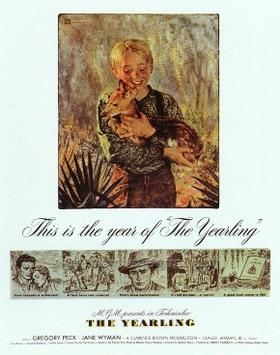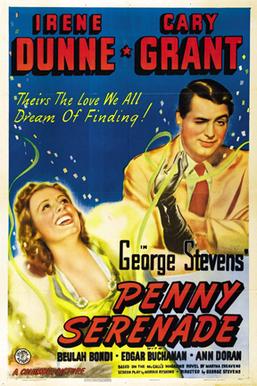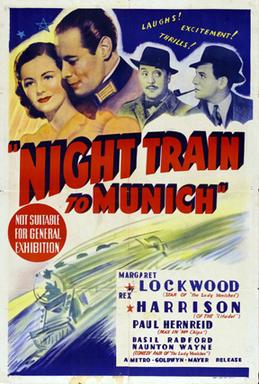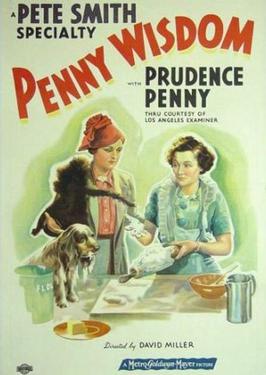
The Yearling is a 1946 American Family Western film directed by Clarence Brown, produced by Sidney Franklin, and released by Metro-Goldwyn-Mayer (MGM). The screenplay by Paul Osborn and John Lee Mahin (uncredited) was adapted from Marjorie Kinnan Rawlings's 1938 novel of the same name. The film stars Gregory Peck, Jane Wyman, Claude Jarman Jr., Chill Wills, and Forrest Tucker.

Jane Mallory Birkin was a British and French actress and singer. She had a decade-long musical and romantic partnership with Serge Gainsbourg. She also had a prolific career as an actress, mostly in French cinema.

Penny Serenade is a 1941 American melodrama film directed by George Stevens starring Irene Dunne and Cary Grant as a loving couple who must overcome adversity to keep their marriage and raise a child. Grant was nominated for the Academy Award for Best Actor for his performance.

The Great Rock 'n' Roll Swindle, also known as The Great Rock and Roll Swindle, is a 1980 British mockumentary film directed by Julien Temple and produced by Don Boyd and Jeremy Thomas. It centres on the British punk rock band Sex Pistols and, most prominently, their manager Malcolm McLaren.

Irene Handl was a British author and character actress who appeared in more than 100 British films.

Wonderwall Music is the debut solo album by English musician George Harrison and the soundtrack to the 1968 film Wonderwall, directed by Joe Massot. Released in November 1968, it was the first solo album by a member of the Beatles, and the first album issued on the band's Apple record label. The songs are all instrumental pieces, except for occasional non-English language vocals, and mostly comprise short musical vignettes. Following his Indian-styled compositions for the Beatles since 1966, he used the film score to further promote Indian classical music by introducing rock audiences to instruments that were relatively little-known in the West – including shehnai, sarod, tar shehnai, tanpura and santoor. The Indian pieces are contrasted by Western musical selections, in the psychedelic rock, experimental, country and ragtime styles.

John Joseph MacGowran was an Irish actor, known for being one of the foremost stage interpreters of the work of Samuel Beckett, as well as his film roles as Professor Abronsius in The Fearless Vampire Killers (1967), Juniper in How I Won the War (1967), and Burke Dennings in The Exorcist (1973), in which MacGowran died during production.

Nothing Sacred is a 1937 American Technicolor screwball comedy film directed by William A. Wellman, produced by David O. Selznick, and starring Carole Lombard and Fredric March with a supporting cast featuring Charles Winninger and Walter Connolly. Ben Hecht was credited with the screenplay based on the 1937 story "Letter to the Editor" by James H. Street, and an array of additional writers, including Ring Lardner Jr., Budd Schulberg, Dorothy Parker, Sidney Howard, Moss Hart, George S. Kaufman and Robert Carson made uncredited contributions.

Night Train to Munich is a 1940 British thriller film directed by Carol Reed and starring Margaret Lockwood and Rex Harrison. Written by Sidney Gilliat and Frank Launder, based on the 1939 short story Report on a Fugitive by Gordon Wellesley, the film is about an inventor and his daughter who are kidnapped by the Gestapo after the Nazis march into Prague in the prelude to the Second World War. A British secret service agent follows them, disguised as a senior German army officer pretending to woo the daughter over to the Nazi cause.

Richard Cameron Wattis was an English actor, co-starring in many popular British comedies of the 1950s and 1960s.

"In the First Place" is a song by the English rock group the Remo Four. It was released as a single in January 1999 to accompany the re-release of the 1968 psychedelic film Wonderwall, directed by Joe Massot. The song was written by Colin Manley and Tony Ashton of the Remo Four and recorded in London in January 1968 during the sessions for George Harrison's Wonderwall Music soundtrack album. Having produced the track for the band, Harrison unearthed the recording 30 years later when supplying Massot with the master tapes for the film's music. Ashton and the Remo Four's drummer, Roy Dyke, also recorded the song with their subsequent group, Ashton, Gardner and Dyke, in 1969.

Come Play with Me is a 1977 British softcore pornographic film, starring Mary Millington and directed by George Harrison Marks. Its cast list contains many well-known British character actors who were not known for appearing in such films. The film is regarded by many as the most successful of the British sex comedies of the seventies. It ran continuously at the Moulin Cinema in Great Windmill Street, Soho, London for 201 weeks, from April 1977 to March 1981, which is listed in the Guinness Book Of World Records as the longest-running screening in Britain. A blue plaque on the former cinema's site commemorates this.

Penny Wisdom is a 1937 American short comedy film directed by David Miller and produced by Pete Smith. In 1938, the film won an Oscar at the 10th Academy Awards for Best Short Subject (Color).

It's a Wonderful World is a 1956 British musical film directed by Val Guest and starring Terence Morgan, George Cole, Mylène Demongeot and Kathleen Harrison. It also features Dennis Lotis, a popular singer at the time. It was made at Shepperton Studios. Songs include: "Rosanne", "When You Came Along", "Girls! Girls! Girls!", "A Few Kisses Ago", and "The Hawaiian War Chant".

The House That Screamed, also released as The Finishing School, is a 1969 Spanish slasher film written and directed by Narciso Ibáñez Serrador, and starring Lilli Palmer, Cristina Galbó, John Moulder-Brown, and Mary Maude. It follows Señora Fourneau, the strict headmistress of a nineteenth-century French boarding school for girls where the students begin to disappear under unusual circumstances.

Fascination is a 1979 French horror film written and directed by Jean Rollin, and starring Franca Maï and Brigitte Lahaie. It focuses on a thief who seeks refuge in a remote château where two mysterious women with potentially sinister intentions are residing.
"Dream Scene" is an experimental composition by English rock musician George Harrison. It was released in November 1968 on his debut solo album, Wonderwall Music, which was the soundtrack to the psychedelic film Wonderwall, directed by Joe Massot. The track is an instrumental piece, apart from occasional non-English language vocals and a spoken word segment. It comprises three sections and combines meditative Indian sounds and singing with passages of Western instrumentation and avant-garde styling, including backwards tape loops and sound effects. After viewing an early edit of Wonderwall at Twickenham Film Studios, Harrison devised the piece to accompany a psychedelic dream sequence in the film. The song serves as the narrative for the sequence, in which a strait-laced professor imagines himself duelling with the fashion photographer boyfriend of the young woman he obsessively spies on through a hole in the wall separating their apartments.

Private Duty Nurses is a 1971 American film written and directed by George Armitage. It is a sequel to The Student Nurses (1970) for New World Pictures. Roger Corman says they got the idea for the title after being sent a letter of complaint about the first film from the Private Duty Nurses Association.

Nude per l'assassino is a 1975 giallo film directed by Andrea Bianchi. Written by Massimo Felisatti, the film stars Nino Castelnuovo, Edwige Fenech and Solvi Stubing, and features music by Berto Pisano. Nude per l'assassino has received mixed to negative reviews from critics.

The Telephone Book is a 1971 American independent sexploitation comedy film written and directed by Nelson Lyon and starring Sarah Kennedy, along with Norman Rose, James Harder, and Jill Clayburgh. The film follows a solitary but lustful woman named Alice, who falls in love with a stranger who makes obscene phone calls to her. The film is satirical in nature, and often breaks the fourth wall.



















